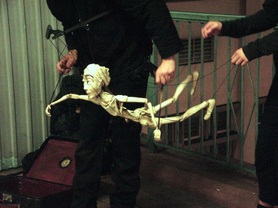 Marionette - Free Art license 1.3 BY-SA–Compatible License SoHome Jacaranda Lilau, Tamelifa Puppeters, Pierre S Frana Line Wiki
Marionette - Free Art license 1.3 BY-SA–Compatible License SoHome Jacaranda Lilau, Tamelifa Puppeters, Pierre S Frana Line Wiki “What happens to me is because of me!”
I need to recall it more often.
This is how free people think, without however bragging carelessly, nor taking on themselves all the guilt of the World.
For they are not madmen, deluded that anything goes, only awakened, self- determined minds who understand from their reality that some things are given but some you make. And even from the given, you can often choose, for they are many...
To be a person, not a toy of fate, you observe and respect that which is given, you do not run into trouble like a fool but - if you keep your head - you are the one who makes the choices, right or poor; for this reason, sooner or later, what you live is your own doing.
Paraphrasing what Joseph de Maistre, wrote so uncharitably about nations - that they end up having the government they deserve* - it is true about individuals too, that those who are unable to fight for their freedom, or to withdraw to the inner exile of their reflective life, or to flee, or perish, deserve their situation.
Psychology has a name for this factor in its jargon - it is called locus of control [1], the place from which you feel that you, what happens to you, is controlled; from inside your lived experience or from somewhere else, outside. If everything is decided elsewhere we are not free, because you are not responsible.
Strangely, the emancipating realm of Reason promised by the Enlightenment to wake up the peoples of the world from the darkness of believing in God-decreed providence, did not live up to its promise. It only replaced the slave-master: divinity deciding everything traded for the revelation of almighty materialist causality.
Educating modern people with a science-given belief that ideas are not world-changing, but mere reflections of given reality, instilling that freedom of will is mere delusion, results in creating puppet-people. Teaching us that on the contrary that the world is a System of systems, ruled by laws independent of us - what matters whether they are divinity's preordained course or Science's objective physical, social, evolving biological universe where our brain and values are ruled by genes, chemistry, electro-physiology - all this ravishes us of the "unreasonable" confidence needed to turn our dreams real and our actions bold enough to count.
Those who expect and accept whatever happens to them to be determined from an external place, above their reach - commanded by the forces of economy, God, history, chance, rulers or hidden conspiring power-groups or -not better - by the inexorable logic and progress of objective natural processes - those people tend to live like objects, spare-parts and servers of machines, doomed to be some kind of puppets and cogs, helpless and submissive.
Those "fools" those poets and dreamers and visionaries who on the contrary hold that in their life-space, they are the main cause of what happens to them - by what they decide, do, create, build and avoid or defeat by means of their actions [3] - are able, I believe, of substantial control. In their mind, and possibly in deed (as my life has proven in many occasions), they are free. As free as one can humbly be. And that is enough for a life-time well lived. They may fail, many do, but even then, they lived free. As a classic Romanian poem claims:
"We owe a death, we all, death reigns
but it is not at all the same
to die a roaring lion
or a dog in chains" [2]
What a paradox! It is in occasions when we just lost "everything", that is all our reassuring ties and fetters, that we have dangerously more freedom, like a puppet freed of its strings; as Janis Joplin cries out “Freedom is just another word for nothing left to lose...”
No need to perish for pride, though. What you cannot master and you do not want, you can often avoid, wait-out and work your way around. Let Time work for you.
You can wait and persist still, tepid, like the Taoist water, passive, looking dumb, yet always ready to flow your way by the irresistible force of gravity. Your choice will come to pass, be certain, "provided you have patience to sit by the riverside".
Warning!
Keep away though from the recurring places in time where “everything not forbidden is compulsory” [4]; or run away from there as soon as you can. Do the same when you see that the "wheels of history" start to turn [5] around you.
If you find this interesting read "The choice of choices"
______________________________________
* Joseph de Maistre: "Every country has the government it deserves (Toute nation a le gouvernement qu’elle mérite") cf J. B. Alden, 1880 The Library Magazine vol 2, General Books (29 march 2010) Comment in a letter he wrote in August 1811, later published in Lettres et Opuscules Inedits (1851) My thanks to Quote/Countrequote - Origins, uses and abuses of famous quotations and phrases
[1] Locus of control: Rotter, J. (1966). Generalized expectancies for internal versus external control of reinforcements. Psychological Monographs, 80, Whole No. 609
[2] George Coşbuc, Decebal catre popor: "C-o moarte tot suntem datori!/…/Dar nu-i totuna leu să mori/Ori câine-nlănţuit." My translation
[3] Hannah Arendt, The Human Condition, Univ. of Chicago Press, Chicago, 1998
[4] T.H.White, The Once and Future King
[5] Martin Luther: "Blood alone moves the wheels of history" (but I never found the historic source where Luther wrote this. Note 2019: in fact it was Mussolini, the the sinister comediante who uttered this monstrosity "Blood alone moves the wheels of history!": Speech in Parma (13 December 1914) quoted in Foreign Affairs, May 1924, p 234
 RSS Feed
RSS Feed